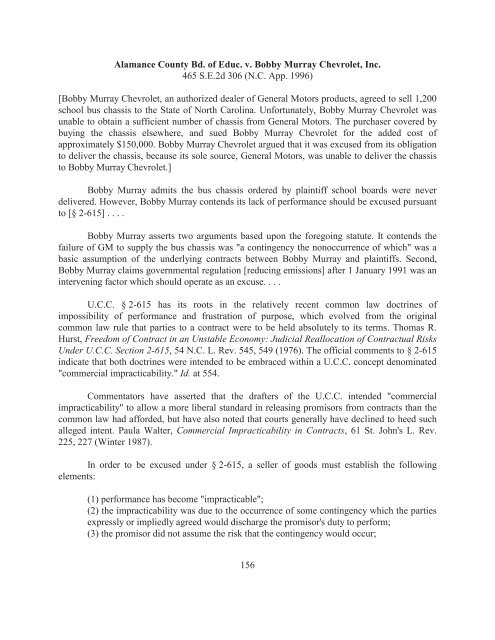Sales and Leases - A Problem-based Approach, 2016a
Sales and Leases - A Problem-based Approach, 2016a
Sales and Leases - A Problem-based Approach, 2016a
You also want an ePaper? Increase the reach of your titles
YUMPU automatically turns print PDFs into web optimized ePapers that Google loves.
Alamance County Bd. of Educ. v. Bobby Murray Chevrolet, Inc.<br />
465 S.E.2d 306 (N.C. App. 1996)<br />
[Bobby Murray Chevrolet, an authorized dealer of General Motors products, agreed to sell 1,200<br />
school bus chassis to the State of North Carolina. Unfortunately, Bobby Murray Chevrolet was<br />
unable to obtain a sufficient number of chassis from General Motors. The purchaser covered by<br />
buying the chassis elsewhere, <strong>and</strong> sued Bobby Murray Chevrolet for the added cost of<br />
approximately $150,000. Bobby Murray Chevrolet argued that it was excused from its obligation<br />
to deliver the chassis, because its sole source, General Motors, was unable to deliver the chassis<br />
to Bobby Murray Chevrolet.]<br />
Bobby Murray admits the bus chassis ordered by plaintiff school boards were never<br />
delivered. However, Bobby Murray contends its lack of performance should be excused pursuant<br />
to [§ 2-615] . . . .<br />
Bobby Murray asserts two arguments <strong>based</strong> upon the foregoing statute. It contends the<br />
failure of GM to supply the bus chassis was "a contingency the nonoccurrence of which" was a<br />
basic assumption of the underlying contracts between Bobby Murray <strong>and</strong> plaintiffs. Second,<br />
Bobby Murray claims governmental regulation [reducing emissions] after 1 January 1991 was an<br />
intervening factor which should operate as an excuse. . . .<br />
U.C.C. § 2-615 has its roots in the relatively recent common law doctrines of<br />
impossibility of performance <strong>and</strong> frustration of purpose, which evolved from the original<br />
common law rule that parties to a contract were to be held absolutely to its terms. Thomas R.<br />
Hurst, Freedom of Contract in an Unstable Economy: Judicial Reallocation of Contractual Risks<br />
Under U.C.C. Section 2-615, 54 N.C. L. Rev. 545, 549 (1976). The official comments to § 2-615<br />
indicate that both doctrines were intended to be embraced within a U.C.C. concept denominated<br />
"commercial impracticability." Id. at 554.<br />
Commentators have asserted that the drafters of the U.C.C. intended "commercial<br />
impracticability" to allow a more liberal st<strong>and</strong>ard in releasing promisors from contracts than the<br />
common law had afforded, but have also noted that courts generally have declined to heed such<br />
alleged intent. Paula Walter, Commercial Impracticability in Contracts, 61 St. John's L. Rev.<br />
225, 227 (Winter 1987).<br />
In order to be excused under § 2-615, a seller of goods must establish the following<br />
elements:<br />
(1) performance has become "impracticable";<br />
(2) the impracticability was due to the occurrence of some contingency which the parties<br />
expressly or impliedly agreed would discharge the promisor's duty to perform;<br />
(3) the promisor did not assume the risk that the contingency would occur;<br />
156


















